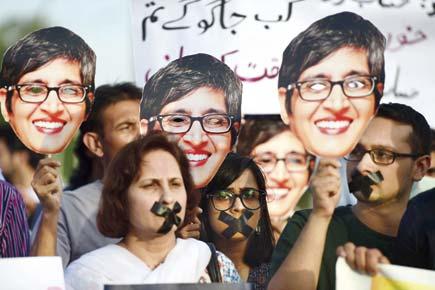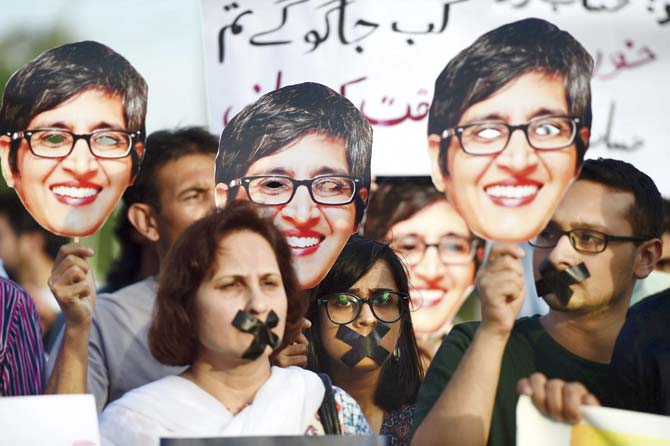The state of mind of those who killed social activist and human rights campaigner Sabeen Mahmud in Karachi on April 24, and that of Mumtaz Qadri, the security guard who killed Punjab Governor Salman Taseer in Lahore on January 4, 2011, is the same as that of the state in Pakistan

 The state of mind of those who killed social activist and human rights campaigner Sabeen Mahmud in Karachi on April 24, and that of Mumtaz Qadri, the security guard who killed Punjab Governor Salman Taseer in Lahore on January 4, 2011, is the same as that of the state in Pakistan. Qadir has been lionised by a wide cross section in Pakistan for killing Taseer as he criticised the Blasphemy Law. These depict both extreme intolerance and hyper paranoia. If the state or the deep state fears an unarmed non-violent social activist to the extent that it can kill her then that state can have umpteen reasons to be frightened of other states.
The state of mind of those who killed social activist and human rights campaigner Sabeen Mahmud in Karachi on April 24, and that of Mumtaz Qadri, the security guard who killed Punjab Governor Salman Taseer in Lahore on January 4, 2011, is the same as that of the state in Pakistan. Qadir has been lionised by a wide cross section in Pakistan for killing Taseer as he criticised the Blasphemy Law. These depict both extreme intolerance and hyper paranoia. If the state or the deep state fears an unarmed non-violent social activist to the extent that it can kill her then that state can have umpteen reasons to be frightened of other states.
 Pakistani activists hold up pictures of rights campaigner, Sabeen Mahmud, who was gunned down in her car minutes after she had hosted a seminar on abuses in the restive Balochistan province. Pic/AFP
Pakistani activists hold up pictures of rights campaigner, Sabeen Mahmud, who was gunned down in her car minutes after she had hosted a seminar on abuses in the restive Balochistan province. Pic/AFP
ADVERTISEMENT
This is not the first time that the deep state in Pakistan, as it is called, has reacted in this extreme manner. Daniel Pearl, the Mumbai-based Wall Street Journal correspondent was abducted and killed in February 2002 when he seemed to be getting too close to the truth about terrorists and their Pakistani connection. The investigative journalist Syed Saleem Shahzad ran foul of the intelligence agencies in 2010 who had warned him about some of his reports and meetings. Eventually his tortured body was found dumped in a canal in May 2011. The attack on Hamid Mir, the well-known and acclaimed Geo TV anchor who had begun to receive death threats after he had hosted a TV show in December 2011 to discuss the role of the ISI in Pakistan’s politics. Eventually he had a miraculous escape in a multiple gun attack in Karachi in April 2014. Raza Rumi, a well-known columnist had to flee Pakistan after an assassination attempt on him by the sectarian Lashkar-e-Jhangvi for his anti-LeJ views.
Sabeen Mahmud was neither a political activist nor an investigative journalist. Sabeen believed in free speech. Her last endeavour was to give a voice to those who were unheard. Her efforts to organise a panel discussion (Unsilencing Balochistan) on the “disappeared” in the state of Balochistan presumably unnerved and annoyed the powers that be. She was high risk to them and had to be silenced.
The social media, especially Twitter, has been full of daily reports about the disappearances with gruesome photographs of Baloch young men brutally tortured. Their mutilated bodies dumped as part of enforced disappearances and kill-and-dump policies of the government, meant to frighten the rest into submission. Many Baloch believe that this is being done to ensure law and order and apparent peace so that Chinese investment development activity can continue. Yet there is hardly any reaction to this. We forget current atrocities but seem to be willing to talk of the genocides of the past. Burzain Waghmer, of the School Of Oriental and African Studies, was very direct in asserting that the deep state in Pakistan was responsible for the disappearance of 435 Baloch, with 455 mutilated bodies being dumped and 348 unrecognisable cadavers having been recovered in 2014.
Lt Gen Asad Durrani’s April 10 interview to Al Jazeera at the Oxford Union is something that all those interested must watch. This was a classic display of realpolitik at its cynical best from a very suave and experienced campaigner speaking in the defence of the organisation he once headed. He described the ISI as a benign organisation that was not responsible for the attacks on people like Hamid Mir. The interview is a valuable insight into the thinking of the Pakistan Army that has prevailed for decades. He explained Pakistan’s DNA in helping the Muslim Ummah like Chechens and Bosnians, all over. Presumably the same logic applies to terrorism in India.
With a massive package from China, and the US still willing to help Pakistan’s military, there would be reason to believe in Pakistan’s ruling circles that their policies have been successful. The relationship with Saudi Arabia is possibly seen as a temporary setback which they can hopefully remedy. They need to be careful about Balochistan though. Much of the recent campaign by the Baloch has also been against the agreements Pakistan has signed with China, as nationalists fear that their natural reserves will be bartered away to China. Following the recent China-Pakistan infrastructure deal, the Chinese footprint will inevitably increase. It would be tempting for Pakistan’s leaders to use the same methods of repression and censorship in Pakistan as is done in China to keep Balochistan “pacified”. This would damage the fast weakening liberal class in Pakistan and make the Baloch even more determined.
The writer is a former chief of Research and Analysis Wing (RAW)
 Subscribe today by clicking the link and stay updated with the latest news!" Click here!
Subscribe today by clicking the link and stay updated with the latest news!" Click here!







